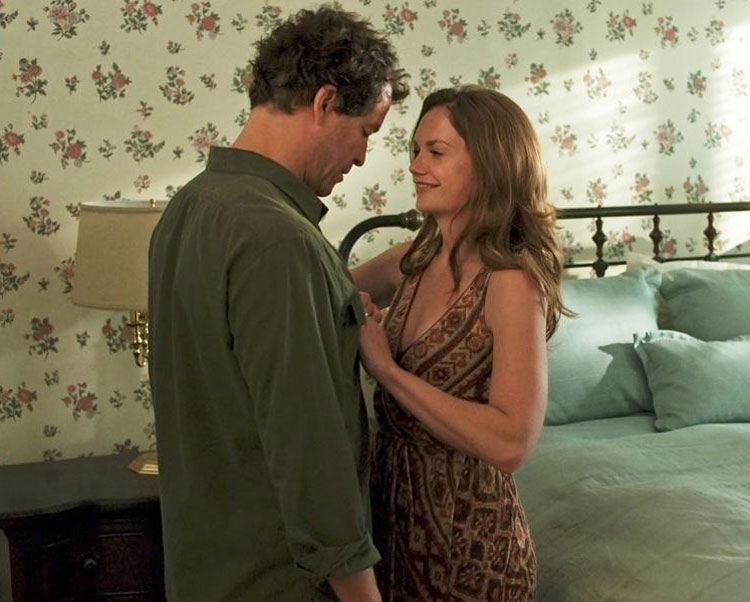 Dominic West and Ruth Wilson in Showtime’s “The Affair”
Dominic West and Ruth Wilson in Showtime’s “The Affair”
“Whatever darkness you think you’re hiding, it’s written all over your fucking face. And you know what? I kind of like it.”
This episode broke away from the show’s formula of simple he said/she said shifting points of view. This can only be seen as a good thing, because the setup of the show from the very beginning has flirted with the danger of lapsing into formula and cliche. And in as pure an example as we can ever hope to find, the script this episode shows just how well the writers know their craft, know these characters, and most important of all, know people and how they think. It’s not just the smart way the stories converge just as the two characters converge, it’s the way the show constantly shows you how people think of themselves, which is not always an easy thing to watch or to convey.
When you’re constructing a personal history that works for you (as Noah and Alison are doing in that interview room, constantly flattering themselves or making themselves out to be victims of a cold world that doesn’t understand them), you’ll place importance on milestones that didn’t seem like milestones at the time or that become milestones through some arbitrary, highly personal process known only to you. You create your own symbols and totems in order to craft a story out of your life instead of facing the horror that it may just be a string of random events with little meaning. And so, the trip to Block Island is written by Alison and Noah to be a dramatic shift in their relationship; the moment when it truly became an affair and not just an infatuation. A metamorphosis that required an almost literal shedding of skins as both characters make the odd but telling choice to buy and put on new clothes before they consummate their affair. Now, we would think the affair started when they were kissing or giving handjobs to each other, but it was important for both characters to see this as the “first” time they committed adultery and we’re not the people who get decide what their story is. We can only sit back and watch them tell it.
What’s fascinating is what happens to their characterizations of each other once the story converges like this. Up until now, Noah has been painting a picture of Alison that makes her seem like a dangerous free spirit who likes to flash her panties a lot; a mysterious teaser with a quiet, maddening confidence that makes his pants move against his will. And Alison has been portraying herself as passive and wounded; surrounded by people who hurt her and constantly hounded by this large, pushy, slightly threatening married guy who won’t leave her alone. But with this episode, Noah told the tale of an Alison full of pain and darkness while Alison told a tale of a Noah who’s sensitive, understands pain, and is deeply concerned with not hurting anyone with this affair. It’s as if, once they committed to the affair, the story shifted in a way for each of them to justify it. How could I not have an affair with this wonderfully, sensitive man who reached out to me in my pain and got me to open up? How could I not have an affair with this sensuous, wounded, complicated woman who understands me and what I need right now?
It’s more clear than ever that the very powerful sexual attraction both people feel is actually secondary to the need for each of them to connect with someone; to talk to someone about their fears, frustrations and sadnesses. For a tawdry getaway from their families so they could fuck, these two sure did a hell of a lot of talking and unloading. Again, in a signal of how well the writing integrates objective and subjective states to make a point, we learned more about these two characters inner thoughts in this hour than in all the previous ones. There was a literal and figurative “coming together.” They couldn’t just run off and have sex. They had to run off, unburden themselves, have sex, fight, unburden themselves more and have sex. You could almost believe this was good for them. Like therapy – which they both clearly need.
The show practically demands that you pore over each character’s version of their story to note the differences and what they say about them (like Noah’s slightly frumpy wife and slutty waitress vs. Alison’s vision of Helen as glamorous and wealthy and herself as simple and plain), but this episode mostly dispensed with that except for a few clever and intriguing instances. If you plan on rewatching the episode, pay attention to the wallpaper in the hotel room. It’s one of the few details that change, but it does so dramatically. In Noah’s tender, tentative version of their afternoon, the wallpaper is a delicate, romantic floral. When the perspective shifts in mid-scene (and mid-fuck) to Alison’s, suddenly the floral is loud and big and ugly. You could either look at it as a flowering of her sexual desire (which strikes us a bit too prettily poetic for this show) or as a reflection of her own tumultuous emotional state and guilt about what she’s doing.
“What do you see when you look at me now?”
“What do you think I see?”
“Death.”
Fatalism hangs heavy in the air over both of them. She is carrying a grief that will never dissipate and he’s been picking at a scab of grief for decades that he knows he needs to let go. Each of them are focused on listening to the dead and trying to figure out their language while neglecting the life going on around them. As Noah admits, it’s that very darkness in each other that attracts them. And again, in a mirroring of the subjective and the objective, these two death-obsessed fatalists are now in a police interrogation room, being questioned over a mysterious possible homicide. Inner life and outer life are constantly reflecting and influencing each other in this story. Or these stories, we should say.
Nowhere did this become more obvious than in the scenes outside the police station; the first time we got to see Alison and Noah through a more or less objective lens. For the first time, the script breaks significantly away from the self-flattering stories they’ve been telling about themselves. So what does it say that the “objective” version of Noah outside the police station is calmly calling his son to discuss his homework while “objective” Alison smokes and spits frantically into her phone that she’s at the fucking police station? Why is Alison suddenly wearing tight, fitted clothing and suede boots, which would seem to be a highly impractical outfit for island living? And just when you think you might be a bit overwhelmed by all the questions about what’s real and what’s a lie, the cop tells each of them contradictory stories about his life. He tells Noah about being divorced and sharing custody of his kids, but he tells Alison a tale of a happy, 25-year marriage. There are clear reasons why he would lie about his own life to them, but it still came as something of a shock once the show conditions you to look for the differences in each character’s story. It’s as if the show pulled out the rug from under us at that point to say “There is no objective reality.” Everyone’s spinning tales of their own experiences – and sometimes quite openly and deliberately.
[Photo Credit: Showtime]
Selena Gomez in Gucci at the 2014 LACMA Art + Film Gala Next Post:
Lena Dunham in Marni at the Royal Festival Hall
Please review our Community Guidelines before posting a comment. Thank you!



